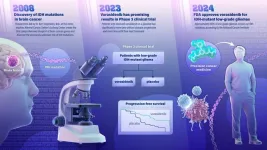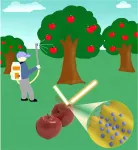(Press-News.org) SOUTHFIELD, MI, Aug. 7, 2024 - New Corewell Health™ research suggests an MRI scan can help predict whether patients with intermediate-risk prostate cancer (cancer confined to the entire prostate) may have more aggressive cancer in five years. Knowing this could potentially help doctors determine if treatment is needed up front vs. using a method called active surveillance where the disease is closely monitored over time. The study, recently published in the Journal of Urology, is the first to evaluate this risk group.
Currently, there has been a growing trend to manage low-risk prostate cancer patients with active surveillance to help patients avoid side effects associated with surgery or radiation. Patients are considered low risk when less than half of one lobe of the prostate is affected, and the cancer cells haven’t mutated or changed much. However, for intermediate-risk patients, choosing what treatment path is best can be a bit more challenging for doctors.
“While active surveillance is the standard of care for low-risk patients, it's been unclear whether patients with a slower-growing form of intermediate-risk prostate cancer should be carefully watched or undergo immediate treatment,” said Kiran Nandalur, M.D., principal investigator of the study and a radiologist at Corewell Health William Beaumont University Hospital. “Our data suggests that an MRI can show suspicious lesions based on size and markers of tumor aggression, which may help doctors differentiate a treatment path for these patients.”
In the study, about 1,500 low- and intermediate-risk patients across Michigan were examined to determine if individuals with suspicious findings on an MRI test returned with a more advanced stage of the disease within five years. Here’s what the study found:
Overall, 36% of the study participants who were watching their prostate cancer demonstrated more aggressive disease within five years.
Considering traditional risk factors and using an MRI classification system that rates lesion suspicion, patients with high-risk imaging features were approximately 130% more likely to have more aggressive disease on follow-up than those with low-risk imaging results.
Suspicious lesions on an MRI indicated more than twice the risk of progressive disease in both low-risk and intermediate-risk prostate cancer patients, which has not been previously shown in the intermediate-risk patients.
“The implication for patients and doctors is that an upfront MRI is important before undertaking any active surveillance for prostate cancer since it may help predict if an individual might come back with worse disease later,” Dr. Nandalur said. “This type of imaging helps pave the way for treatment planning so patients can live their lives to the fullest whether they decide to watch their cancer or seek treatment.”
Additional institutions contributing to the study include the Department of Urology at Wayne State University in Detroit, Michigan; Michigan Institute of Urology in West Bloomfield, Michigan; Brady Urologic Institute at Johns Hopkins University in Baltimore, Maryland; and the Michigan Urological Surgery Improvement Collaborative.
About Corewell Health™
People are at the heart of everything we do, and the inspiration for our legacy of outstanding outcomes, innovation, strong community partnerships, philanthropy and transparency. Corewell Health is a not-for-profit health system that provides health care and coverage with an exceptional team of 65,000+ dedicated people—including more than 12,000 physicians and advanced practice providers and more than 15,500 nurses providing care and services in 21 hospitals, 300+ outpatient locations and several post-acute facilities—and Priority Health, a provider-sponsored health plan serving more than 1.3 million members. Through experience and collaboration, we are reimagining a better, more equitable model of health and wellness. For more information, visit corewellhealth.org.
END
Study suggests an MRI may help doctors predict more aggressive prostate cancer in patients
Findings could indicate which patients need immediate treatment and who can be monitored
2024-08-07
ELSE PRESS RELEASES FROM THIS DATE:
FDA approves drug targeting Johns Hopkins-discovered brain cancer gene mutation
2024-08-07
FOR IMMEDIATE RELEASE
A new drug for treatment of a type of brain cancer, called IDH-mutant low-grade glioma, was approved Aug. 6 by the U.S. Food and Drug Administration (FDA). The promising new drug stems from a 2008 genetic discovery made at the Johns Hopkins Kimmel Cancer Center.
The drug, called vorasidenib, is a targeted cancer therapy that works by inhibiting the activity of a mutated gene called IDH, slowing the growth of the cancer. The gene was identified by Bert Vogelstein, M.D., and team at the Johns Hopkins Kimmel Cancer Center’s ...
LOINC® semiannual release: Global partners collaborate to enhance semantic interoperability with health terminology updates
2024-08-07
INDIANAPOLIS -- Regenstrief Institute’s latest LOINC® content update underscores significant strides in health terminology, accomplished through extensive collaboration with the international health community. The semiannual release aims to bolster the electronic exchange of clinical and laboratory data, fostering the use and implementation of LOINC standards across healthcare systems globally.
The Regenstrief Institute Health Data Standards (HDS) unit, which administers LOINC, and partners collaborated to create more than 3,000 updates, including ...
Researchers show pesticide contamination is more than apple skin deep
2024-08-07
Pesticides and herbicides are critical to ensuring food security worldwide, but these substances can present a safety risk to people who unwittingly ingest them. Protecting human health, therefore, demands sensitive analytical methods to identify even trace levels of potentially harmful substances. Now, researchers reporting in ACS’ Nano Letters have developed a high-tech imaging method to detect pesticide contamination at low levels, and its application on fruits reveals that current food safety practices ...
Current challenges evaluated for measuring and treating fatigue in multiple sclerosis
2024-08-07
East Hanover, NJ – August 7, 2024 – Kessler Foundation research scientist John DeLuca, PhD, has published a significant clinical article in Journal of Neurology, shedding light on the elusive nature of fatigue in multiple sclerosis (MS) and its implications for treatment. The study provides a comprehensive review of current challenges in defining, measuring, and treating MS-related fatigue, offering new insights and directions for future research.
The open access article, “Fatigue in multiple sclerosis: can we measure it and can we treat it?” (Doi: 10.1007/s00415-024-12524-9), was published on July ...
Disparities found in survival benefits for people receiving bystander CPR for cardiac arrest
2024-08-07
A National Institutes of Health (NIH)-supported study has found race- and sex-based differences in the increased chances of survival from people who received bystander cardiopulmonary resuscitation (CPR) for out-of-hospital cardiac arrest. Average survival benefits for cardiac arrest, when the heart suddenly stops beating, could be three times as high for white adults compared to Black adults and twice as high for men compared to women. The findings published in Circulation.
“CPR saves lives — that, we know,” said Paula Einhorn, M.D., a program officer at NIH’s National, Heart, Lung, and Blood Institute ...
Florey research finds association between prenatal exposure to plastics and autism in boys
2024-08-07
Florey researchers have found evidence of higher levels of the plastic chemical bisphenol A (BPA) in pregnant mothers who gave birth to sons with autism.
Research published in Nature Communications, led by Florey scientists Dr Wah Chin Boon and Professor Anne-Louise Ponsonby, supports the hypothesis of a possible link between autism and exposure to plastic chemicals in the womb.
Professor Ponsonby said the researchers analysed two large birth cohorts – the Barwon Infant Study (BIS) in Australia and the Columbia Centre for Children’s Health and Environment in the USA.
“Exposure to plastic chemicals ...
World’s highest-performance superconducting wire segment fabricated at UB
2024-08-07
BUFFALO, N.Y. — Our energy future may depend on high-temperature superconducting (HTS) wires. This technology’s ability to carry electricity without resistance at temperatures higher than those required by traditional superconductors could revolutionize the electric grid and even enable commercial nuclear fusion.
Yet these large-scale applications won’t happen until HTS wires can be fabricated at a price-performance metric equal to that of the plain copper wire sold at your ...
Bacterial gut diversity improves the athletic performance of racehorses
2024-08-07
The composition of gut bacteria of Thoroughbred racehorses at one-month-old can predict their future athletic performance, according to a new study from the University of Surrey. Foals with lower bacterial diversity at 28 days old also had a significantly increased risk of respiratory disease later in life.
Researchers from Surrey's School of Veterinary Medicine and School of Bioscience, led by Professor Chris Proudman, investigated the composition of gut bacteria in Thoroughbred foals bred for flat ...
Fishing is causing frightened fish to flee when they should flirt
2024-08-07
Populations of squaretail grouper face an uncertain future as new research shows fishing that targets their spawning sites is causing males to be repeatedly scared away from their territories during their short mating meet-ups.
By fleeing for safety, individuals are losing valuable time to catch the eye and court female fish.
A study, led by scientists at Lancaster University and published today in Biology Letters, shows that the impacts of fishing that targets squaretail grouper spawning sites goes beyond those fish that are caught, causing widespread behavioural change in those left behind.
These changes impact ability to reproduce. With disrupted mating, fewer offspring ...
Your best friend from high school? Here’s why their genes mattered
2024-08-07
Mom always said, “Choose your friends wisely.” Now a study led by a Rutgers Health professor shows she was onto something: Their traits can rub off on you – especially ones that are in their genes.
The genetic makeup of adolescent peers may have long-term consequences for individual risk of drug and alcohol use disorders, depression and anxiety, the groundbreaking study has found.
“Peers’ genetic predispositions for psychiatric and substance use disorders are associated with an individual's own risk of developing ...
LAST 30 PRESS RELEASES:
Hope for global banana farming in genetic discovery
Mirror image pheromones help beetles swipe right
Prenatal lead exposure related to worse cognitive function in adults
Research alert: Understanding substance use across the full spectrum of sexual identity
Pekingese, Shih Tzu and Staffordshire Bull Terrier among twelve dog breeds at risk of serious breathing condition
Selected dog breeds with most breathing trouble identified in new study
Interplay of class and gender may influence social judgments differently between cultures
Pollen counts can be predicted by machine learning models using meteorological data with more than 80% accuracy even a week ahead, for both grass and birch tree pollen, which could be key in effective
Rewriting our understanding of early hominin dispersal to Eurasia
Rising simultaneous wildfire risk compromises international firefighting efforts
Honey bee "dance floors" can be accurately located with a new method, mapping where in the hive forager bees perform waggle dances to signal the location of pollen and nectar for their nestmates
Exercise and nutritional drinks can reduce the need for care in dementia
Michelson Medical Research Foundation awards $750,000 to rising immunology leaders
SfN announces Early Career Policy Ambassadors Class of 2026
Spiritual practices strongly associated with reduced risk for hazardous alcohol and drug use
Novel vaccine protects against C. diff disease and recurrence
An “electrical” circadian clock balances growth between shoots and roots
Largest study of rare skin cancer in Mexican patients shows its more complex than previously thought
Colonists dredged away Sydney’s natural oyster reefs. Now science knows how best to restore them.
Joint and independent associations of gestational diabetes and depression with childhood obesity
Spirituality and harmful or hazardous alcohol and other drug use
New plastic material could solve energy storage challenge, researchers report
Mapping protein production in brain cells yields new insights for brain disease
Exposing a hidden anchor for HIV replication
Can Europe be climate-neutral by 2050? New monitor tracks the pace of the energy transition
Major heart attack study reveals ‘survival paradox’: Frail men at higher risk of death than women despite better treatment
Medicare patients get different stroke care depending on plan, analysis reveals
Polyploidy-induced senescence may drive aging, tissue repair, and cancer risk
Study shows that treating patients with lifestyle medicine may help reduce clinician burnout
Experimental and numerical framework for acoustic streaming prediction in mid-air phased arrays
[Press-News.org] Study suggests an MRI may help doctors predict more aggressive prostate cancer in patientsFindings could indicate which patients need immediate treatment and who can be monitored







